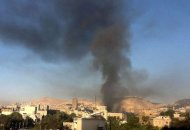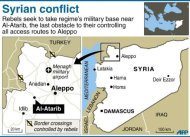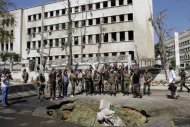Deadly
gunfire erupted around the headquarters compound of the Syrian army in
the heart of Damascus on Wednesday following twin bombings targeting the
heavily guarded complex.
Iran's Press TV said the shooting killed one of its correspondents
and wounded its Damascus bureau chief as they reported from the scene.The Syrian army said all of its officers had escaped unharmed from the bombings targeting its general staff headquarters in the capital's Umayyad Square district.
It said there had been "indiscriminate" shooting around the perimeter of the compound and in adjacent streets.
The Britain-based Syrian Observatory for Human Rights said that fierce clashes erupted leaving dead on both sides.
The spectacular assault on the command centre of the army's operations against the 18-month rebellion against President Bashar al-Assad came as the worsening bloodshed dominated proceedings at the UN General Assembly in New York.
"The terrorist explosions were caused by two bombs but the only damage was to property," Information Minister Omran al-Zohbi told state television.
"All military commanders and army spokespeople are fine," he added.
A communique issued by the army also said there had been no casualties among its officers.
"Armed terrorist groups with affiliations abroad this morning carried out a new act of terrorism by detonating a car bomb and another device on the edge of the general staff compound," the statement said.
"All senior commanders and other officers are safe and sound, and none of them was wounded," it.
The Syrian Observatory for Human Rights said there were deaths on both sides as intense clashes erupted after the bombings.
Iran's state-funded English-language Press TV said its correspondent Maya Nasser was killed and its Damascus bureau chief Hussein Mortada wounded in the gunfire.
It was the most spectacular attack on the Syrian security forces since a July 18 suicide bombing against a heavily guarded headquarters in Damascus killed four top regime officials, including defence minister General Daoud Rajha and Assad's brother-in-law, Assef Shawkat.
It came as the Syrian opposition's foreign backers ramped up calls for Assad's exit at the UN General Assembly in New York.
The calls by US President Barack Obama and other Western leaders came as another 114 civilians were killed Tuesday in intense fighting across the country, according to the Observatory's figures.
Early Wednesday, pro-government militia executed at least 16 civilians in their homes in the Barzeh neighbourhood of north Damascus, the Observatory said.
"Militiamen burst into their homes in the Barzeh neighbourhood at 5 am (0200 GMT) and shot them dead," Observatory chief Rami Abdel Rahman told AFP.
He said those killed included six women and three children.
Barzeh is a Sunni Muslim district considered sympathetic to the opposition to Assad's minority Alawite-dominated regime.
Mainly Alawite militia groups have been accused of carrying out some of the most notorious killings of civilians of the conflict.
Qatari emir, Sheikh Hamad bin Khalifa Al-Thani -- whose government is, with Saudi Arabia, the leading champion of arming the rebels fighting against Assad's regime -- called for Arab military intervention in the face of the failure of efforts at the UN Security Council to end the bloodshed.
"It is better for Arab countries themselves to intervene out of their humanitarian, political and military duties and do what is necessary to stop the bloodshed," Sheikh Hamad told the General Assembly.
Earlier, Qatar's prime minister, Sheikh Hamad bin Jassem al-Thani, told CNN that there was a "Plan B" for ending the conflict.
"You need to make safe haven areas, first of all," he said. "That would require a no-fly zone.
"If the Syrians want to break that, that's another subject. We need somebody to have the teeth to tell them 'don't do that', because that will not be allowed."
French President Francois Hollande said the United Nations should protect "liberated zones" under opposition control to help civilians and refugees.
UN Secretary General Ban Ki-moon called on the Security Council to "solidly and concretely" support the peace efforts of UN-Arab League peace envoy Lakhdar Brahimi, who has stated there will be no quick solution.
The 15-nation council is hopelessly deadlocked, with Russia and China resisting international action on the war.
Obama, meanwhile, delivered a blistering attack on Assad in his speech to the UN assembly.
"The regime of Bashar al-Assad must come to an end so that the suffering of the Syrian people can stop, and a new dawn can begin," he said.
A State Department official later told AFP that the United States is set to unveil more aid for the Syrian opposition this week, but stressed the supplies will still not include weapons or ammunition.
"We've been clear about our assistance and the type of assistance we are providing and that is going to continue," the official said, after Secretary of State Hillary Clinton met peace envoy Brahimi.
More about the story
- Qatar calls for Arab intervention in Syria
- Explosions strike top Syrian army building
- Syrian rebels bomb security building in Damascus
- Arab nations should intervene in Syria - Qatari leader
- West turns up heat on Iran and Syria at UN
- Brahimi meets Syria's Assad, warns of world threat
- Opposition says Brahimi bringing 'new ideas' on Syria




ไม่มีความคิดเห็น:
แสดงความคิดเห็น